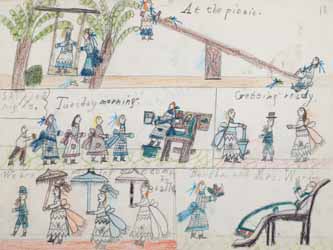Collections Online
Bertha Louise Cogswell drawing book, volume 3, page 13
To order an image, navigate to the full
display and click "request this image"
on the blue toolbar.
-
Choose an alternate description of this item written for these projects:
- MHS 225th Anniversary
- Main description
[ This description is from the project: Object of the Month ]
This colorful drawing is one page selected from the seven volumes of drawing books of Bertha Louise Cogswell (1868-1962) that were recently acquired by the Massachusetts Historical Society. Throughout the 155 pages of pencil and crayon drawings, the young artist depicts her life in Cambridge, Mass., including games, parties, holidays, social calls, and travel (see the web presentation of drawing book volume 6, page 13). The pictures, captioned in pencil, unfold as a kind of illustrated diary in several sequential panels per page. If Bertha was between the ages of 8 and 12 when she illustrated her books, they date from sometime between 1876 and 1880.
The vibrantly colored pictures portray Bertha's daily activities with friends and family. Examples of captions include: "In the evening," "At the party," "Going to school," and "Playing with our [trundle] hoops." Particularly striking are her drawings of Christmas celebrations, Fourth of July parades, and weddings. Furnishings, decorations, and toys are recorded in remarkable detail. She also illustrates a trip to the White Mountains in New Hampshire to see the Flume Gorge and the Old Man in the Mountain, and another to the geysers at Saratoga Springs, New York.
Bertha's friends May and Lizzie play a starring role in the stories, along with a few other recurring characters. In volume 3, set in approximately 1879, a woman named Mrs. Ward has a fainting fit (the caption reads: "Mrs. Ward has fainted away"), and the doctor diagnoses her with rheumatic fever. Later panels show Mrs. Ward as she is carried downstairs, recuperates in a reclining chair, walks outdoors, and eventually moves in with her sister.
What makes Bertha's drawings unique is not just the insight they provide into the life of a young girl in late 19th-century Massachusetts. While they contain many details of Victorian fashion (at 11, she gets her ears "bored," or pierced) and recreation (including sledding, beachcombing, and playing croquet), they also depict Bertha's aspirations and expectations for her future life. In volumes 4-7, she draws herself at the ages of 17, 20, 23, and 26. She imagines herself marrying; raising four children named George, Mabel, Arthur, and Alice; and participating in charitable work.
Who Was Bertha Louise Cogswell?
Bertha was the daughter of Francis Cogswell (1827-1914) of Cambridge, Mass. and his second wife, Esther Maria (Noyes) Cogswell (1838-1912). Francis was a long-time Massachusetts educator, serving as the headmaster of the Putnam Grammar School in East Cambridge for 20 years and superintendent of the Cambridge public schools for more than 30.
Like her father, Bertha grew up to be a teacher in Cambridge. She received her bachelor's degree from Boston University in 1892 and her master's in 1895, writing her thesis on Tennyson's "In Memoriam." She taught at the Cambridge High and Latin School. Despite her childhood predictions, Bertha never married and had no children. She died in 1962.
Using the Collection
This collection was purchased by the Massachusetts Historical Society in November 2010. To preserve the fragile volumes and protect Bertha's drawings from further smudging, digital photographs were taken of each page for use by researchers. The complete set of drawings are available as color digital facsimiles in the MHS Reading Room. View the catalog record for the collection in ABIGAIL.
Sources
General Alumni Catalogue of Boston University, 1918. Compiled by W. J. Maxwell under the direction of the University.
Jameson, Ephraim Orcutt. The Cogswells in America. Boston: A Mudge & Son, 1884.
"New Hampshire Necrology." The Granite Monthly: A New Hampshire Magazine Devoted to History, Biography, Literature and State Progress. Vol. 46. Concord, N. H.: The Granite Monthly Company, 1914.

